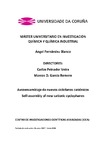Autoensamblaje de nuevos ciclofanos catiónicos

View/
Use this link to cite
http://hdl.handle.net/2183/21504Collections
- Traballos académicos (FCIE) [1007]
Metadata
Show full item recordTitle
Autoensamblaje de nuevos ciclofanos catiónicosAlternative Title(s)
Self-assembly of new cationic cyclophanesAuthor(s)
Directors
Peinador, CarlosGarcía, Marcos D.
Date
2018Center/Dept./Entity
Universidade da Coruña. Facultade de CienciasDescription
Traballo fin de mestrado (UDC.CIE). Investigación química y química industrial. Curso 2017/2018Abstract
[Resumen]: La búsqueda de nuevos macrociclos que sean capaces de actuar como receptores de entidades moleculares ha sido de gran interés en el campo de la química supramolecular. En el presente trabajo se expone la síntesis de dos nuevos ciclofanos mediante el uso de la química covalente dinámica que son capaces de incorporar en sus cavidades sustratos aromáticos π-excedentes mediante interacciones de tipo no covalente. La particularidad de esta síntesis recae en la capacidad de los elementos constituyentes para alcanzar el complejo de inclusión mediante un control termodinámico. Este control se consigue a través de la formación de enlaces covalentes dinámicos del tipo imina. Por último, se estudian procesos de intercambio de contraion para liberar a los ciclofanos del sustrato y que puedan ser utilizados como receptores de otras moléculas o agregados. [Abstract]: Synthesis of new macrocycles capable of acting as hosts for different molecular entities have been of great interest in the field of supramolecular chemistry. The synthesis of two new cyclophanes through dynamic covalent chemistry that are able to incorporate π-excedent aromatic substracts into their cavities with non-covalent interactions is exposed in the present work. The particularity of this kind of chemistry lies in the ability of the building blocks to reach the inclusion complex under thermodynamic control. This thermodynamic control is achieved through the formation of dynamic covalent bonds of imine type. Finally, counterion exchange processes are studied to free cyclophanes from the substrate so they can be use as hosts for other molecules or aggregates.
Keywords
Química supramolecular
Autoensamblaje (Química)
Compuestos cíclicos
Ciclofanos
Ligandos
Enlaces químicos
Autoensamblaje (Química)
Compuestos cíclicos
Ciclofanos
Ligandos
Enlaces químicos





